Archive for May, 2015
Friday, May 29th, 2015
One of the most difficult challenges an expanding business can face is how to bring its products and services to other countries. Language barriers are just the beginning – regulations (domestic and international) must be minded, marketing strategies must be adjusted, contacts must be made, and oftentimes additional funding is required to get a company’s exporting activity off the ground.
To find out more about the resources available to New Hampshire businesses in navigating this landscape, we interviewed Karen Wyman, trade compliance manager at Elbit Systems of America in Merrimack. Ms. Wyman is also the chairman of the Granite State District Export Council, a private, non-profit organization whose members are appointed to four-year terms by the US Secretary of Commerce. DECs connect experienced international business people for mentoring and advising other businesses on their entry or expansion into international markets.
1. The official mission of the Granite State DEC is “to encourage and support exports that strengthen local business, stimulate economic growth and create jobs.” What does that look like on a day-to-day basis?
On a daily basis, the DEC members are called upon to assist other New Hampshire exporters with specific questions or issues they face. DEC members are vetted and approved by the US Department of Commerce to ensure they meet the requirements of DEC membership, such as being able to be of benefit to the local exporting community in a productive and ethical way.
Other activities include the management and running of various grant programs that we have co-funded with other exporting agencies and groups within New Hampshire.
We also participate in the many international trade events hosted around the state and coordinate provision of services with our many partners, in New Hampshire and around the world, especially the New Hampshire Export Assistance Center, New Hampshire Office of International Commerce, New Hampshire Aerospace and Defense Export Consortium and Small Business Development Centers.
We often act as a multiplier for our partners, promoting their events, supporting their activities financially and administratively, etc.
2. Can you share a couple of examples of how the DEC assisted individual businesses recently?
– One DEC member has assisted a New Hampshire exporter needing information on how to export to India and the “ins” and “outs” of having a local representative there;
– Another DEC member has assisted several New Hampshire exporters with specific and general questions regarding export compliance (the regulations overseeing exports of items of national security sensitivity);
– One DEC member recently assisted a New Hampshire exporter with an issue related to the use of a carnet in Italy. A carnet, also known as a merchandise passport, can simplify customs procedures for temporary imports into a country. – Ed.
3. What, in your opinion, are the biggest challenges businesses face today when trying to export their products and services?
– Lack of knowledge of how to penetrate a specific foreign market. Each country has different sets of regulations, norms, and cultural expectations, all of which impact how a product or service is sold in that country. To varying degrees an exporter needs to modify its export strategy for each target country. It’s hard to know all the information you need to be successful in that market. Through the DEC and its many partners, we can help an exporter find those elements needed for its success.
– Complex export regulations. New Hampshire is strong in high technology products and services, whether it’s for the medical, IT, aerospace or defense sectors. Due to the high level of technology involved, the US has regulations to ensure that those technologies do not fall into enemy hands. The various sets of regulations are complex, confusing, and in many cases, overreaching in their control. The DEC, along with our partners and the Congressional Delegation, have been advocating for the alignment and revision of these regulations to meet both the needs of national security and the exporter.
– The need for funding export expansions. Many companies need assistance with capital needed to expand due to an international contract, project, etc., but banks are often skittish about helping. A number of sources for help exist for New Hampshire exporters:
* Export Import Bank – This bank has been a vital resource for a number of exporters as they need capital to fund their international endeavors. It’s a US government agency, which receives no funding from taxes, with the sole purpose of helping US exporters!
* NH Export Expansion Fund – a micro grant system funded in part by the DEC to get a small international project off the ground.
* SBA financial programs – SBA has several programs to assist small exporters.
4. How did you, personally, come to the DEC, and what inspires you to do this work on behalf of NH’s exporters?
I used to work at the state’s International Trade Resource Center when the DEC was reinitiated. I was asked to be a member so I could provide my knowledge in a capacity that was needed by our exporters.
I love helping companies expand their markets internationally. I’ve traveled around the world and have seen and experienced the complexities that exist. It’s very satisfying to help an exporter succeed in a market.
The help I provide ultimately helps the overall state economy. New Hampshire has a very strong mix of beautiful nature, great education and advanced business. I live here, I want to keep it thriving for all of us to enjoy.
5. What events does the DEC have coming up for businesses interested in learning about or ramping up their exporting activities?
Upcoming events are:
– NHADEC annual conference, 4- 8 pm, Wednesday, June 10;
– Healthcare Executive Service to India, Monday, July 27 -Saturday, Aug. 01;
– State of New Hampshire Trade Mission to Colombia, Oct. 19-21.
More information for these events and a listing of all of our events, and those we promote, can be found on our website.
Tags: exporting in NH, Granite State District Export Council, NH Export Expansion fund, Office of International Commerce
Posted in NH Business Matters | Comments Off on 5 Questions with Karen Wyman, Granite State District Export Council
Thursday, May 21st, 2015
Transportation and logistics are often at the forefront of business location and expansion decisions – particularly for businesses that need to efficiently move people and products around the country or around the world. Having a first-class airport just a short drive away certainly makes a strong case for choosing the Granite State.
New Hampshire’s biggest airport facility, Manchester-Boston Regional Airport (MHT), certainly fits that bill. For this week’s interview, we went behind the scenes with Mark Paul Brewer, A.A.E., Airport Director for MHT. In addition to over 30 years of airport management experience, Brewer has served as chairman and held multiple positions within the American Association of Airport Executives. He’s also served on the Transportation Security Administration’s Security Technology Deployment Office and was an industry representative on the TSA’s Airside Security Task Force.
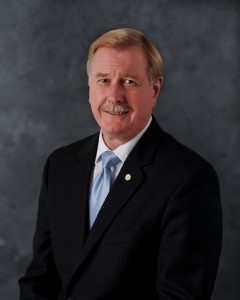 Mark Brewer 1. MHT was recently named the “Most Reliable Station” out of 93 cities served by Southwest Airlines, a company with an already stellar customer service reputation. What’s the secret of MHT’s success, for Southwest or any of the other passenger airlines?
There are several important factors that contributed to this impressive achievement.
First, and most importantly, Southwest has terrific local leadership in New Hampshire. Station Manager Tom Labrie and his staff do a great job with on-time performance and work hard to minimize customer inconvenience due to mishandled checked baggage.
Second, our highly-skilled airport operations/maintenance personnel maintain the airport and airfield so the airlines can operate safely and efficiently.
Finally, the airport works closely in partnership with all the airport tenants to ensure that our customers have a positive experience when traveling through MHT.
2. How has MHT evolved to better serve business travelers over the last year or two?
Frequent-flying business travelers are very important to MHT. For that reason, the airport has focused a lot of energy during the past few years trying to improve services and make air travel through MHT even more convenient.
The airport continues to work with its airlines, both current and prospective, to enhance air service by adding new nonstop destinations, increasing frequency to popular destinations, and upgrading aircraft. Recently, Delta Air Lines converted its 50-seat regional jets serving Detroit to larger regional jets (76 seats) with a first-class cabin. Delta also added a fourth daily jet to New York-LaGuardia for the summer schedule.
American Airlines has increased its investment at MHT, extending the deployment of its second daily Charlotte nonstop flight in 2015.
United has added a fourth daily roundtrip to Newark and upgraded its turboprop service to regional jets.
The TSA implemented its pre-check program at MHT, which allows eligible travelers expedited screening and the ability to keep footwear on and laptops in bags.
The airport is launching a new initiative called FastPass. This customer-focused program is designed to make parking at the airport even easier, and add value to the parking experience. Participants will receive a special proximity card that allows easy in/easy out of the garage and surface parking lots. Parking charges will go directly onto a debit or credit card on file and receipts will be emailed to the customer. FastPass also allows parkers to earn points for each visit that can be redeemed for future parking at the airport.
3. One of MHT’s missions is to develop, promote, and manage the airport to stimulate economic growth. What role would you say MHT plays in attracting out-of-state businesses to expand or relocate to New Hampshire?
Airports are important economic engines for the regions they serve, creating jobs, facilitating commerce and providing access to the global marketplace. MHT contributes approximately $1 billion each year to the New Hampshire economy.
One of the first questions many prospective companies ask when exploring opportunities to relocate or expand their business in New Hampshire is about the airport. They want to make sure they can conveniently move their employees and products around the country and the world. We work closely with the Department of Resources and Economic Development and various local and regional economic development organizations to help companies better understand the benefits of investing and growing their business in New Hampshire.
4. Passenger service gets a lot of attention, but your cargo operation is thriving, too. How will Londonderry’s expanded FedEx facility and new UPS facility affect your operations?
Air cargo is a critical component of any regional transportation system, and a good indicator of the overall strength of the local economy. MHT is the third largest cargo airport in New England, processing more cargo in 2014 (160 million pounds) than Providence, RI; Portland, Maine; Portsmouth; Bangor, Maine; and Burlington, Vt. combined.
Both FedEx and UPS already have a significant presence on the cargo ramp at MHT. The completion of the FedEx Ground Distribution Facility and the UPS-Pratt Whitney Northeast Logistics Center just south of the airport in Londonderry will certainly add to the cargo handling capabilities in New Hampshire. The airport is excited to be a part of the ongoing development along Pettengill Road.
5. What other exciting developments or milestones are on the horizon for MHT?
One of the most frequently asked questions the airport receives is, “When’s jetBlue coming to New Hampshire?” I assure you, the airport is working closely with jetBlue and other airlines to highlight all opportunities for profitable new service additions at MHT.
The airport will begin construction of a consolidated rental car facility in June. This new facility will be located in Parking Lot A and will be incorporated into the airport’s parking garage. Combining the operations of Hertz, Avis, Dollar, National/Alamo, Enterprise, and Thrifty in one convenient location creates efficiencies for the rental car companies and greatly enhances customer service for our passengers. The new rental car facility is scheduled to open in February 2016.
Tags: Manchester-Boston Regional Airport, Mark Brewer, New Hampshire airports, New Hampshire logistics
Posted in NH Business Matters | Comments Off on 5 Questions with Mark Brewer, MHT Airport Director
Wednesday, May 20th, 2015
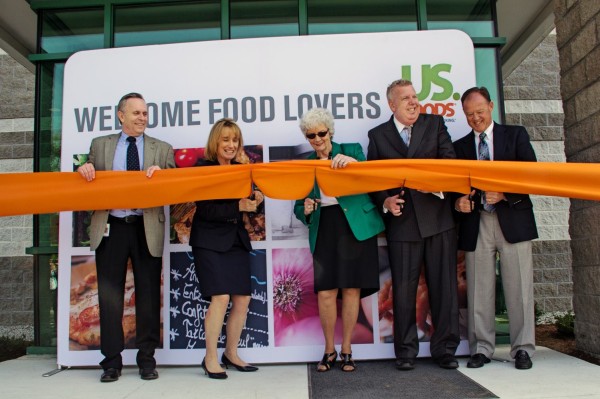 Gov. Maggie Hassan joins dignitaries Tuesday for the ribbon cutting at US Foods in Seabrook. Seabrook celebrated its new neighbor on Tuesday with the opening of US Foods’ newest distribution center.
“The new efficient and modern facility allows us to better serve our approximately 3,000 customers throughout the New England area and provides the nearly 300 employees in the location with an optimal working environment,” said John Glynn, president, Boston Division, US Foods. “We are thrilled to join the Seabrook business community and continue to bring our innovative products and business solutions to chefs, restaurant owners and food service operators throughout the area.”
The new 500,000 square-foot facility is LEED certified and includes a number of green enhancements, such as energy efficient lighting and a cascade refrigeration system that uses CO2 as a refrigeration fluid in place of ammonia, reducing environmental impact and increasing energy efficiency. A dedicated fleet fueling and maintenance area will further help the company operate even more efficiently.
(BUSINESS WIRE)
Tags: New England distribution center, nh, Seabrook, US Foods
Posted in NH Business Matters | Comments Off on Seabrook Welcomes US Foods
Friday, May 15th, 2015
Earlier this week, the New Hampshire Procurement and Technical Assistance Program won the Small Business Champion Award from the U.S. Small Business Administration. In giving the award, the SBA referred to NH-PTAP as a “group of dedicated and hardworking individuals,” and added, “NH-PTAP works tirelessly for their clients in their pursuit of government contract opportunities.”
By a lucky coincidence (really!), our interviewee this week is Martha Keene, who’s been a procurement specialist with NH-PTAP since 2002. She’s APTAC-certified as a Level II contracting assistance specialist, consulting with businesses around the state to educate them one-on-one about marketing to the government and about procurement, including both direct opportunities with the government and indirect opportunities as a subcontractor or supplier to prime contractors.
She took some time out of her schedule to talk this week about how to succeed in government bidding and contracting, as well as why New Hampshire succeeds when it comes to setting Granite State businesses up for valuable contracting opportunities.
1. You’re the longest-tenured member of the NH-PTAP team. What do you love most about the work you do?
It’s very rewarding at the end of the day knowing that I helped a company get ready to work for the government at some level, and then watching it move forward and win their its contract.
 Martha Keene ~ NH-PTAP 2. Are the NH-PTAP services designed only for enterprise-level businesses, or do you assist small businesses and entrepreneurs, too?
Size is not a factor – we will work with businesses as small as one person, and most of our clients are small businesses. Readiness is a much bigger issue than size.
We like our clients to be in businesses for at least two years, successfully.
But, it all depends on the company’s products or services. We never turn people away. We talk to them and show them what is involved with contracting and help them make the determination to move forward or not. If a company is not ready for our services, we direct them to one of our resource partners to help them become more ready for government contracting, and then they eventually come back to us.
3. After working with more than 2,000 businesses, have you seen a common set of attributes that lead to success in the government contracting space?
Knowing the marketplace for your products or services.
Focusing on your capabilities – your special niche.
Knowing your competition.
Having a good accounting system, solid financials and business processes helps a lot.
Being persistent and networking with anyone who can help you grow your business.
4.What are one or two of the big mistakes businesses make when trying to land a government contract, and how do you help solve them?
One mistake is that people don’t follow directions and this makes them unresponsive. People need to take more time to read and review their bids – attention to details is always critical. The simple mistake of not signing a document can make you ‘unresponsive.’ So always take your time to read and review everything.
One of NH-PTAP’s services is to review solicitations with our clients and to work with them on bids and proposals to make sure that they are properly responsive.
5. If a business located out of state was considering a move here, what would you say sets New Hampshire apart?
Almost every state has a procurement technical assistance center/program, so these services are not unique to just New Hampshire. Where we excel is that we offer very good one-on-one counseling services to our clients to help them decide if government contracting is right for them or not.
New Hampshire business culture is generally more aggressive – we have a willingness to look for regional or national business opportunities much more than is typical of some of our neighboring states.
Contact Martha at martha.keene@dred.nh.gov.
Tags: Martha Keene, New Procurement Technical Assistance Program, NH-PTAP, sell to the government
Posted in NH Business Matters | Comments Off on 5 Questions with Martha Keene, New Hampshire Procurement Technical Assistance Program
Wednesday, May 13th, 2015
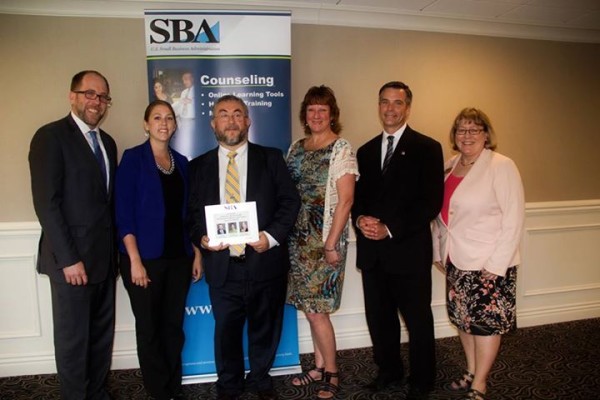 From left: Seth Goodall, Small Business Administration New England regional administrator; Amanda Duquette, Dave Pease, Martha Keene, NH-PTAP; Jeffrey Rose, Department of Resources and Economic Development commissioner; Greta Johansson, SBA-NH district director The U.S. Small Business Administration and the New Hampshire Bankers Association honored David Pease, Martha Keene and Amanda Duquette of the New Hampshire Procurement Technical Assistance Program with the 2015 New Hampshire Small Business Champion Award at their annual awards event on Tuesday.
NH PTAP helps hundreds of businesses each year navigate through the process of bidding on, and winning, contracts with local, state and federal government agencies. In New Hampshire, Pease, Duquette and Keene have earned a reputation for working tirelessly for their clients in areas such as researching federal regulations and databases and helping businesses develop strategies for marketing to government agencies and prime contractors.
Over the past five years, NH PTAP has assisted 1,391 businesses across the state obtain federal, state and local contracts totaling over $1.9 billion in prime contract awards and an additional $275 million in subcontracting awards.
That adds up to an impressive contribution to the New Hampshire economy.
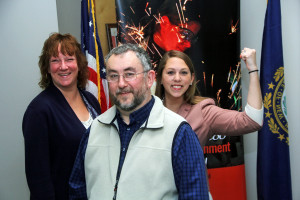 Martha Keene, Dave Pease, Amanda Duquette “Without PTAP’s assistance, we would not be anywhere near where we are today, if we survived at all,” wrote business owner Joe Lopez of Arrow Security and Training in his letter of support. “I refer every company I work with to them, which is the best compliment I can give.”
The work of NH PTAP has earned the respect of business owners throughout the state and is an invaluable partner to the SBA district office.
Congratulations Dave, Martha and Amanda! We are very proud of your work.
Lorna Colquhoun
Communications Director
NH Division of Economic Development
PS: Here is information on the next seminar in which NH PTAP will be participating. You should go.
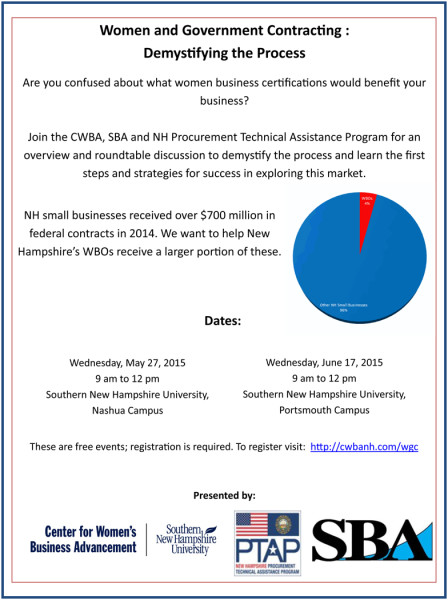
Tags: government contracting in NH, NH-PTAP, SBA
Posted in NH Business Matters | Comments Off on Small Business Champions: NH-PTAP Team Demystifies Government Contracting
Tuesday, May 12th, 2015
 State of New Hampshire Trade Mission to Colombia State of New Hampshire Trade Mission to Colombia
What: Trade mission to Colombia with potential spin off to one additional nearby market
When: October 19-23, 2015
Where: Bogota, Colombia
Who: New Hampshire businesses
Cost: $1,800
*New Hampshire Export Expansion Funds available to cover B2B matchmaking services for spin off market only.
More details to come!
For more information, please contact:
Tina Kasim, Program Manager
NH Office of International Commerce
Email: tina.kasim@dred.nh.gov
Phone: 603-271-8444
Justin Oslowski, Director
New Hampshire U.S. Export Assistance Center, U.S. Commercial Service
Justin.Oslowski@trade.gov
603-953-0210
Tags: NH Office of International Commerce, trade mission to Colombia, U.S. Commercial Service
Posted in NH Business Matters | Comments Off on Announcing Trade Mission to Colombia for New Hampshire Businesses
Friday, May 8th, 2015
Earlier this year, we interviewed Mike Cashion of the Concord Young Professionals Group and learned a great deal about what motivates today’s young professionals when it comes to employment and workforce issues. However, that’s just one side of the young professional story.
To explore more of the facets of young professional lives and how they affect the New Hampshire economy, we interviewed Jaimie Sousa, president of the board of directors for Fusion, the young professionals group in the Lakes Region. Fusion isn’t just about networking, as you’ll learn in the interview – it’s also deeply focused on civic engagement and community development.
 Jaimie Sousa 1. Fusion is one of the newer YP groups in New Hampshire. Can you tell us a bit about the genesis of the organization and its guiding principles?
Fusion officially filed organizing documents on 3/1/13. We’re an all-volunteer organization focused on networking, education and giving back to our community. Along with the other groups under the Stay Work Play umbrella, Fusion is primarily focused on making it easy and fun to connect with like-minded people. Events are open to the public and typically have some type of activity that serves as a fun way to meet people. The activities also serve as a conversation starter, so there’s less pressure on starting a conversation with people you might not know yet.
2. When we interviewed Mike Cashion from the Concord YP group earlier this year, he called out Fusion on a shortlist of YP groups doing unique things in the state. How are you setting yourselves apart from the typical networking group?
That’s awesome! Stay Work Play hosts a conference call for all of the groups to chat about what is going on in their area each month and this allows us to exchange ideas and support each other. We have learned a lot from other groups, but we’ve also found a way to embrace the uniqueness of the Lakes Region.
We take advantage of our surroundings by including nearby activities and visiting new and longstanding local businesses for our events. We are planning our third year hosting a stand-up paddle boarding event at EKAL in Meredith – one of our most popular activities. We also had a great turnout for kickboxing at Beyond the Belt, which raised money for Gilford Got Lunch.
This is another thing that sets Fusion apart: Our events are not just fundraisers for our group. We raise funds for other charities in an effort to support the community that we love so much!
Finally, we’re often asked if there’s an age limit for Fusion events and the answer is no. Our goal is to develop a network across generations to enhance the sustainability of the Lakes Region in the future. If the young professionals are eventually to replace the generations that have come before them, it would be silly to attempt to start from scratch. We believe our community depends on us working together, and so we’re happy to welcome all who want to be involved.
3. How do you see Fusion playing a role in helping businesses grow in New Hampshire and in attracting out-of-state businesses to relocate or expand here?
Ultimately, businesses grow through the connections you make. We find that people come to our events and meet people they genuinely like and with whom they’d naturally do business. Our events are about getting to know the person behind the business card, and making connections that are lasting rather than transactional.
The fact that New Hampshire has the Stay Work Play network throughout the state serves as a benefit to out-of-state businesses or businesses expanding within the state. The concern with building or growing a business is often not being able to attract or retain a workforce in a rural environment. When I moved to New Hampshire from Massachusetts/Rhode Island, people thought I was going to live in a tent in the woods. Stay Work Play’s website has a ton of information showing that New Hampshire is so much more than that. And each region’s group works to help people feel a sense of community and belonging. We believe this will help with employee retention.
4. You started a new program, the IMPACT Awards, to recognize members of the community that personify the Fusion mission. What’s impressed you most about this year’s nominees?
The best part of the process so far has been listening in to the judges as they narrowed down the finalists. The nominees all have something within them that pushed them to become passionately involved in their community. These are the people that start something from nothing, push the community forward, and really make a difference.
5. After the IMPACT Awards are given out this week, what’s next for Fusion? How will you continue to make your mark on the Granite State in 2015?
Creating the IMPACT Awards was a big deal for us. Coupled with our Annual Networking Event, this gives Fusion two large-scale networking events each year, which is exciting because people were asking for more. We also enjoy our smaller scale events and activities that allow people to make deeper connections more quickly, so we think this is a good balance. Fusion will also continue our annual Bowl-A-Thon, which is scheduled for September this year.
Beyond the events we have scheduled, we’re excited to be growing as a board and gaining the ability to do more than ever before. Each year we get better, and the best way to keep up with our new events and programs is to connect with us on Facebook.
Tags: "Stay Work & Play", Fusion, Jaimie Sousa, NH young professionals
Posted in NH Business Matters | Comments Off on 5 Questions with Jaimie Sousa, Fusion
Friday, May 1st, 2015
Manufacturing in New Hampshire’s largest industry and a vital cog turning our economy. We caught up with Zenagui Brahim, president of the New Hampshire Manufacturing Extension Partnership, to catch up on what’s happening and how his organization is working to make manufacturing even stronger.
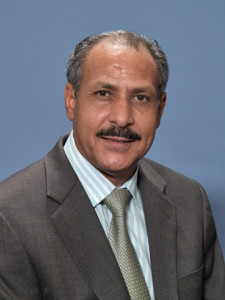 Zenagui Brahim ~NHMEP 1. When people think of manufacturing, they often think of big factories, but the reality is much different. What does New Hampshire manufacturing look like today?
Thriving. New Hampshire manufacturing has evolved and is becoming a vibrant and growing sector of the economy. It may best be described by what high school students said after they visited neighboring manufacturers during Manufacturing Week in 2013 and 2014.
I learned that in a manufacturing company, there are many jobs and a lot of them seem very interesting.
… that manufacturing is a field where there will always be room for improvement and you can always better yourself as an employee; it is very hi tech and clean.
Manufacturing is a lot more advanced than I once thought.
Manufacturing got its upgrade to the 21st century.”
Today, manufacturing in New Hampshire is more advanced and productive. Manufacturers are more agile as they become more engaged in operational excellence in design, production, delivery and service. NH MEP’s survey last fall shows that 62 percent of respondents from the 88 participating manufacturers (in Manufacturing Week) reported growth of some level during 2013. A number of reports show that our manufacturers will continue to see growth. However, our survey also shows that more than 50 percent said workforce limitations ranks as a significant barrier to growth. The workforce skills’ gap remains a challenge to the manufacturing community across the nation.
Manufacturing here is recognized for its contribution to the state economy. There is now more collaboration between educators, manufacturers and decision makers to address these workforce challenges.
2. You just wrapped up the What’s So Cool About Manufacturing? contest, matching up middle schools with local manufacturers for video projects. What are some of the biggest benefits to come out of that challenge?
First, we have made the participating middle-schoolers new stars, for putting together videos that highlight and showcase what is cool about manufacturing. Second, this endeavor has clearly shown that educators and manufacturers can work together and collaborate in the promotion of New Hampshire manufacturing. Third, the team at the NH Division of Economic Development and their partners have learned a lot. Fourth, with these videos, I hope more middle schoolers will have the opportunity to learn about career in advanced manufacturing, get more engaged and learn about STEM, and pursue experiential learning opportunities when they reach high school.
3. Where is the manufacturing industry headed in 2015 and beyond? What are the top trends to watch?
As we move forward, more manufacturers will embrace advanced technologies, automation and digital manufacturing. Small and medium sized manufacturers (SMEs) are asked to participate in design endeavors with their customers. As more OEMs become system integrators, they will be asking their suppliers to be involved in some ways in the design of their products.
Our survey shows that 81 percent of the 88 decisions-makers polled said that new technology and their ability to adapt to change are important to extremely important for them to grow.
I believe we will see industry clusters, such as the aerospace and defense cluster, solidify. Continuous and effective collaboration between educators, manufacturers and policy-makers will certainly pave the way for an advanced manufacturing ecosystem that will help rebrand the industry.
But a significant new trend has evolved during the last few years and that is the growing involvement of New Hampshire manufacturers in building the future skilled workforce in advanced manufacturing. Last fall, 58 manufacturers held open houses during Manufacturing Week, which resulted in 1,100 high school visits to these manufacturers.
To continue to grow, the state’s manufacturers will need to rebrand and build on the strength of the existing and growing industry clusters such as the aerospace and defense, medical device and biotech, electronics and precision machining.
4. How is MEP helping New Hampshire manufacturers to get the skilled workforce needed to help the industry thrive?
Over the last six years, NH MEP has trained over 6,600 manufacturing employees in continuous improvement, quality management, leadership and supply chain management. More information on our programs is available at www.nhmep.org.
NH MEP, in collaboration with the Division of Economic Development; the Department of Education; the Community College System of New Hampshire; New Hampshire Business and Industry Association, and the New Hampshire High Tech Council, and as well as a large number of local economic development organizations, chambers of commerce, and high schools and career and technical education centers and others, has organized New Hampshire Manufacturing Week during the last couple years. The week consists of two days of visits by high school students to local manufacturers; one day of visits to the CTEs and community colleges, culminating with the annual Governor’s Advanced Manufacturing and High Technology Summit.
NH MEP also helps high schools establish manufacturing advisory boards to develop advanced manufacturing curricula, provide guidance to the faculty and internships and mentoring to students.
I, along with David DeWitt of Phase 65 and Gary Groleau, from New Hampshire Ball Bearing, visit high schools and middle schools to speak about careers in advanced manufacturing.
5. What events or programs are coming up to assist manufacturers with their businesses?
In addition to continuing offering proven programs such as Principles of Lean, Lean Certificate, Six Sigma and our always-popular ISO Collaborative, NH MEP plans to launch an exciting new initiative on Technology-Driven Market Intelligence (TDMI). TDMI is a growth service that provides a systematic and comprehensive approach to technology-focused market intelligence. Specifically, TDMI identifies the benefits and the market impacts related to our clients’ technology-based assets and provide the customized actionable intelligence our clients need.
NH MEP is also scheduling its second Business Growth Collaborative, which is a program of six workshops designed to identify critical strategic and tactical actions clients can take to improve revenue, profitability and position their organizations in the marketplace. The program also includes one year of coaching and advising with the instructor.
Tags: manufacturing in NH, NH MEP, What's So Cool About Manufacturing, Zenagui Brahim
Posted in NH Business Matters | Comments Off on 5 Questions with Zenagui Brahim, New Hampshire Manufacturing Extension Partnership
|


















